The Last Hurrah

Brief Synopsis
Cast & Crew
John Ford
Spencer Tracy
Jeffrey Hunter
Dianne Foster
Pat O'brien
Basil Rathbone
Film Details
Technical Specs

Synopsis
Frank Skeffington, the Irish-American mayor of a large New England city, descends his staircase, pausing, as he does every morning, to place a fresh rose by the portrait of his deceased wife. At the bottom of the stairs wait his secretary, the city wardheelers and various aides, and outside the office door is the usual crowd of noisy constituents. Skeffington's staff notes that Amos Force's newspaper opposes the mayor's recently announced bid for a fifth term, even though the two major opposing candidates are unimpressive: Charles J. Hennessey, a longtime but harmless opponent, and Kevin McCluskey, a young naval hero with few ideas of his own. In Force's newsroom, the sour old publisher is planning a series of articles in support of McCluskey, not because he respects the younger candidate but because he despises Skeffington. Adam Caulfield, the writer of the paper's popular sports column and Skeffington's nephew, asks his uncle why Force so dislikes him. Skeffington reveals that his own mother, once a maid in the home of Force's father, was humiliated and then fired by the elder Force for stealing two overripe bananas and a small apple, a "crime" usually accepted by the wealthy Yankees who employed poor Irish immigrants. The Force family had never forgiven their maid's son for becoming mayor of the city. During this conversation, Skeffington asks Adam to cover his re-election campaign "from the inside." Uninterested in politics, but fascinated by his sometimes unethical but always humane uncle, Adam agrees, much to the chagrin of his wife Maeve and her father, Roger Sugrue. Nevertheless, Adam's respect and affection for his uncle, emotions not expressed by Skeffington's playboy son "Junior," increase as he attends rallies and other campaign events. At the wake of Knocko Minihan, Adam is at first outraged when Skeffington fills the widow's house with his supporters, who hand out cigars while conducting ward business. Skeffington's manager, John Gorman, explains that while admittedly trying to promote his campaign, Skeffington has nonetheless succeeded in packing the wake of the universally disliked Minihan with well-wishers, a fact that deeply touches the grieving widow. When Adam later hears Skeffington threaten to take greedy undertaker Johnny Degnan before his licensing board unless he reduces the high cost of the services, Adam becomes his uncle's avid supporter. After the funeral, Skeffington learns that the city's bankers have decided not to provide the loan needed to clean up one of the city's worst slums. Furious, he and his cronies invade the exclusive Plymouth Club, where banker Norman Cass, Sr. is lunching with a group of Skeffington detractors, among them Force and Bishop Gardner. Skeffington begs the men not to use the housing project as a political football, but Cass and his associates remain adamant. That afternoon, Skeffington flatters Cass's simpering son into becoming the fire commissioner. The next day, the mayor shows the elder Cass a photograph of his son, looking particularly foolish in his fireman's helmet, and asks, "Do I announce the appointment?" Cass agrees to provide the loan in exchange for the embarrassing photograph. Soon the Plymouth Club becomes the site of McCluskey's campaign headquarters, and the young candidate begins to make numerous television appearances. On the night before the election, Skeffington has dinner with Adam and Maeve and finally succeeds in charming the young woman. After the couple votes, however, she smilingly refuses to reveal her choice to her husband. As the returns begin to come in, Skeffington's campaign headquarters is noisy and upbeat, but it soon becomes apparent that McCluskey has won the election by a landslide. After hearing the television reporter describe the election as the biggest political upset in the city's history, Skeffington warmly congratulates his opponent and announces that he now plans to run for governor. The mayor then walks home alone as McCluskey's raucous victory parade fills the streets. Shrugging sheepishly at the portrait of his wife, Skeffington begins to climb the stairs but suddenly suffers a heart attack and collapses. The next day, as Skeffington rests in bed, scores of well-wishers appear outside the mayor's residence. Though his doctor orders him to see no one, Skeffington insists on saying goodbye to his old friends. Sugrue disdainfully asserts that if he had it to do over again, Skeffington would surely live his life differently. Barely able to open his eyes, Skeffington exclaims, "Like hell I would!" and dies.

Director
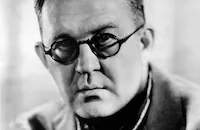
John Ford
Cast

Spencer Tracy

Jeffrey Hunter

Dianne Foster
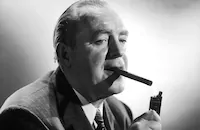
Pat O'brien

Basil Rathbone
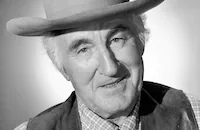
Donald Crisp

James Gleason

Edward Brophy

John Carradine

Willis Bouchey
Basil Ruysdael

Ricardo Cortez
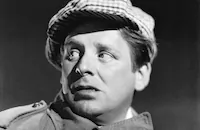
Wallace Ford
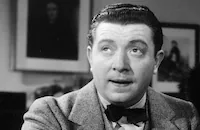
Frank Mchugh
Carleton Young

Frank Albertson
Bob Sweeney

William Leslie

Anna Lee

Ken Curtis
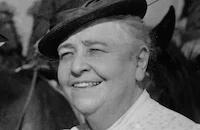
Jane Darwell
O. Z. Whitehead
Arthur Walsh
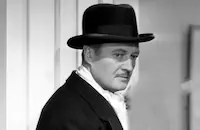
Edmund Lowe
Charles Fitzsimons

Helen Westcott
Ruth Warren
Mimi Doyle
Dan Borzage

James Flavin
William Forrest
Frank Sully
Charlie Sullivan
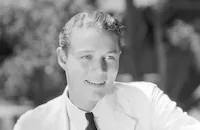
Bill Henry

Rand Brooks
Harry Lauter
William Neff
John Bryant
William Hudson
Jack Pennick
Ruth Clifford
Richard Deacon
Harry Tyler
Robert Levin
Julius Tannen
Hal K. Dawson
Harry Tenbrook
Clete Roberts
Tommy Earwood
Harriet Wollis
Helaine Wollis
Debbie Cooney
Sam Harris
Frank Baker
Raoul Freeman
Jimmy Murphy
Joe Forte
Helen Gereghty
Millie Fitzgerald
Molly Roden

Eve March
Ed "skipper" Mcnally
Bobette Bentley
June Kirby
Roy Jenson
Charles Hicks
Edward Featherstone
Frank Marlowe
Jack Henderson
Gail Bonney
Dick Ryan
Ted Stanhope
Joe Mcguinn
George Spaulding
Joe Devlin
Tommy Jackson
Harry Strang
Brian O'hara
Frank Scannell
Phil Tully
Charles Trowbridge
Charles Anthony Hughes
Edmund Cobb
Dick Keene
William H. O'brien
Webster La Grange
Wilbur Mack
Stuart Holmes
Clint Dorrington
Victor Romito
Buck Russell
Johnny Leone
Alex Akimoff
Rolland Jones
Emma Palmese
Cosmo Sardo
Chuck Howard
Frank Magrin
Charles Cirillo
Mike Jeffers
Phillip Adams
Bud Cokes
James Dime
Stephen Soldi
Lenny Smith
Richard Dale Clark
John Deauville
William Janssen
George Ford
Bob Perry
Jordan Shelley
Dick Cherney
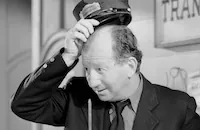
Hank Mann
Anna Stein
Sue Shannon
Fred Kennedy
Harvey Perry
Steve Benton
Claire Dellatorre
Crew
John Ford
John Ford
Charles Granucci
Helen Hunt
William Kiernan
Charles Lawton Jr.
John Livadary
Jean Louis
Harry Mills
Jack Murray
Sam Nelson
Frank Nugent
Robert Peterson
Bill Reynolds
Wingate Smith

Photo Collections
Videos
Movie Clip




Hosted Intro
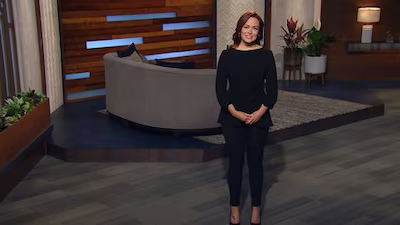



Promo
Film Details
Technical Specs

Articles
The Last Hurrah
In The Last Hurrah, Tracy plays Frank Skeffington, the long-time mayor of a city that's an obvious stand-in for Boston. (The city's actual mayor, James M. Curley, later sued the producers for "invasion of privacy," because he felt the Skeffington character too closely resembled him. He didn't win the case.) Skeffington is a widower, and has a no-good son (Arthur Walsh) who does little except play jazz and try to pick up girls. Skeffington's nephew, Adam Caulfield (Jeffrey Hunter), writes for a local newspaper, and winds up covering what will become Skeffington's final bid for office, one that doesn't proceed smoothly. The film is overly sentimental at times, but Ford brings a visual elegance to this vanished world of Irish-American politicking. And Tracy is as wonderful as you expect him to be in the role.
"I've joked about retiring but this could be the picture," Tracy said while filming The Last Hurrah. "I'm superstitious you know that's a part of being Irish and I'm back with John Ford again, for the first time since I started out with him twenty-eight years ago [in Up the River in 1930]. I feel this is the proper place for me to end. Even the title is prophetic."
The shoot for The Last Hurrah was as calm as The Old Man and the Sea was tense. Tracy found himself surrounded by old friends and fellow actors from Ford's unofficial repertory such as Donald Crisp, John Carradine, Wallace Ford, Jane Darwell, James Gleason, Ricardo Cortez, Basil Rathbone, Edmund Lowe and Pat O'Brien, who hadn't worked with Ford since the 1932 film, Airmail. In Print the Legend: The Life and Times of John Ford by Scott Eyman, O'Brien recalled that on the set of The Last Hurrah, Ford "would never talk the part you were playing, he'd just tell you what he wanted. 'I hope you can get it,' he'd say, chewing on that handkerchief he always had. When you failed, he'd say, 'That wasn't what I wanted. Try to get what I wanted. We're going to take another whack at it and it better be good.' And after you finally got it he'd come over and put his arms around you. 'Why the hell didn't you get it in the first place?' he'd say. Ford was the genius of them all. He was an artist drawing a portrait in oil."
The only potentially disruptive incident that occurred during the filming was when someone showed up with a case of whiskey in celebration of St. Patrick's Day. Ford, who was a heavy drinker like most of the Irish cast and crew members, exploded in anger, "Jesus Christ, what do you want to do, shut down the picture?" and the booze was carted off.
By 1958, Tracy had already won two Academy Awards for Best Actor, and many people in the film industry wanted him to get another one before he hung it up. Given its literary pedigree, insiders felt that he stood a good chance to win with The Old Man and the Sea. Tracy, on the other hand, believed that he delivered far superior work in The Last Hurrah. He would have been happy to simply forget about The Old Man and the Sea and move on. The same went for Hemingway, who called Tracy's performance in the film, the work of, "a rich, fat actor". (Time magazine seemed to agree with a review that stated, "in The Old Man and the Sea [Tracy] sulked at the director and hardly bothered to act at all".)
Tracy WAS nominated for an Oscar®, all right. But it was for The Old Man and the Sea. He was watching from the comfort of his living room when David Niven walked away with that year's award for Best Actor, for his memorable work in Separate Tables (1958). Tracy was especially pleased that he didn't have to climb on-stage, as many of his peers were forced to do, and help Jerry Lewis fill an extra 20 minutes of TV time when the ceremony wrapped earlier than expected! Apparently, in those days, winners knew how to keep their speeches short. Tracy, by the way, postponed his retirement and would appear in six more pictures before death ended his glorious career in 1967.
As for John Ford, The Last Hurrah was not one of his more successful films, despite being honored as Best Director of the year by the National Board of Review. The director, like Frank Skeffington in his film, no longer seemed interested in keeping up with the modern world. Now in his middle sixties, his desire and creative drive for picture making was on the decline: "I don't want to make great sprawling pictures," he stated. "I want to make films in a kitchen...The old enthusiasm has gone, maybe. But don't quote that - oh, hell, you can quote it."
Producer: John Ford
Director: John Ford
Screenplay: Frank S. Nugent, based on the novel by Edwin O'Connor
Cinematography: Charles Lawton, Jr.
Editing: Jack Murray
Art Design: Robert Peterson
Set Designer: William Kiernan
Gowns: Jean Louis
Sound: John Livadary, Harry Mills
Cast: Spencer Tracy (Frank Skeffington), Jeffrey Hunter (Adam Caulfield), Dianne Foster (Maeve Caulfield), Pat O'Brien (John Gorman), Basil Rathbone (Norman Cass, Sr.), Donald Crisp (The Cardinal), James Gleason (Duke Gillen),Edward Brophy (Ditto Boland), John Carradine (Amos Force), Willis Bouchey (Roger Sugrue), Basil Ruysdael (Bishop Gardner), Ricardo Cortez (Sam Weinberg).
BW-121m. Letterboxed.
by Paul Tatara

The Last Hurrah
Quotes
Trivia
Orson Welles was Ford's original choice to play Frank Skeffington but the offer did not reach Welles in time for him to agree to the part. Welles and Ford were fans of each other's work.
Notes
Edwin O'Connor's novel was loosely based on the life of Boston's Irish-American political boss, James M. Curley (1874-1958). Colorful and shrewd, Curley was the four-term Democratic mayor of Boston, the governor of Massachusetts and a two-term Congressman. Even though he was convicted of mail fraud in 1947, he continued to serve as mayor, and in 1950 received a full pardon from President Harry S. Truman. O'Connor's novel was purportedly based on Curley's failed 1949 mayoral campaign.
The publication of the novel generated considerable controversy and a lawsuit. In August 1958, Los Angeles Times reported that Curley filed a lawsuit against Columbia, arguing that the film would constitute an invasion of privacy, as well as damage the prospects of any film adaptation of his autobiography, I'd Do It Again. According to Variety, Columbia argued in court that it had a signed and notarized agreement with Curley releasing the studio from any liability in connection with the film in exchange for $25,000. Curley denied signing the agreement, and both the notary and Curley's agent, James E. Sullivan, to whom the studio made the payment, had disappeared. In its review, Motion Picture Herald Prod Digest pointed out that the two sides later settled the lawsuit out of court.
Hollywood Reporter news items yield the following information about the film: In September 1956, James Cagney was mentioned to star. A March 21, 1958 item noted that veteran producer-director David Butler was to play the part of "Jack Mangan," but had to withdraw because of previous commitments. Although various news items from February-April 1958 place Paul Behrer, Stubby Kruger, Larry Wallace, Harvey Lopez, Snub Pollard, Sam O'Reilly, Irving Schwartz, Rod Gray Eagle, Suzanne Maurer, Sven Thommsen and Hans Gerhardt in the cast, their appearance in the released film has not been confirmed. Jeffrey Hunter was borrowed from Twentieth Century-Fox to appear in the film. Long-time character actor James Gleason (1886-1959) made his final feature film appearance in The Last Hurrah. According to Daily Variety, the film was produced for $2,500,000. Modern sources include James Waters in the cast. O'Connor's novel was also the basis for a 1977 television film of the same name, starring Carroll O'Connor and directed by Vincent Sherman.

Miscellaneous Notes
Best Amercian Films by the 1958 National Board of Review.
Voted Best Director, Best Actor (Tracy) and One of the Ten
Released in United States 1999
Released in United States Fall November 1958
Released in United States on Video June 16, 1988
Released in United States 1999 (Shown in New York City (Film Forum) as part of program "Columbia 75" November 19 - January 13, 1999.)
Released in United States on Video June 16, 1988
Released in United States Fall November 1958














